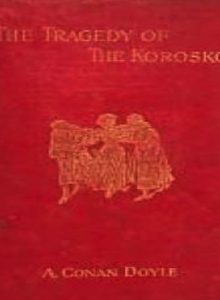The Tragedy of the Korosko

Navigating Desolation: A Review of “The Tragedy of the Korosko” by Arthur Conan Doyle
Rating: ★★★★☆
“The Tragedy of the Korosko,” penned by the legendary Sir Arthur Conan Doyle, presents readers with a gripping tale that ventures beyond the familiar realms of Sherlock Holmes into the harsh and unforgiving landscapes of the Egyptian desert. Originally published in 1898, this adventure novel explores themes of survival, human nature, and the clash of cultures.
**Plot and Setting (★★★★☆):**
Set against the backdrop of the colonial era, the story unfolds as a group of diverse characters—British tourists, an Austrian doctor, an American lady, and an assortment of other travelers—find themselves aboard the steamer Korosko on a journey up the Nile. However, their expedition takes an unexpected turn when they are captured by a group of dervishes, plunging them into a perilous situation in the arid wilderness. The stark beauty and harshness of the Egyptian desert serve as a dramatic and imposing stage for the unfolding tragedy.
Conan Doyle masterfully captures the essence of the desert landscape, immersing readers in the vastness of the sand dunes, the scorching sun, and the desperation of the characters as they navigate this unforgiving terrain. The setting becomes a character in itself, shaping the actions and decisions of the individuals caught in its merciless grasp.
**Characterization (★★★☆☆):**
The ensemble cast of characters in “The Tragedy of the Korosko” is diverse, each contributing a unique perspective to the unfolding drama. From the privileged English tourists to the resourceful American, the characters represent different facets of society, and their interactions highlight the cultural and social dynamics of the time. However, some characters feel more like archetypes than fully fleshed-out individuals, and their development is at times overshadowed by the urgency of the plot.
Despite this, the novel explores the psychological impact of the characters’ captivity, delving into themes of resilience, fear, and camaraderie. The varying reactions to the crisis add depth to the narrative, showcasing Conan Doyle’s ability to explore the intricacies of human nature under duress.
**Themes (★★★★☆):**
Conan Doyle uses “The Tragedy of the Korosko” to address broader themes such as the clash of civilizations, the consequences of imperialism, and the resilience of the human spirit. The encounter between the Western travelers and the dervishes provides a platform for examining cultural misunderstandings and challenging preconceptions. The novel prompts reflection on the implications of colonialism, offering a nuanced perspective on the interactions between the colonizers and the colonized.
The themes of survival and sacrifice are woven into the fabric of the narrative, adding depth and complexity to the story. As the characters confront the harsh realities of their situation, readers are prompted to ponder the limits of human endurance and the choices individuals make when faced with extreme circumstances.
**Writing Style (★★★★☆):**
Conan Doyle’s writing style, characterized by its clarity and vivid descriptions, is a notable strength of the novel. The author’s ability to paint a picture of the Egyptian desert and evoke a sense of urgency during critical moments contributes to the overall immersive experience. The prose is engaging, carrying the reader through the twists and turns of the narrative with a steady pace.
While some elements of the dialogue may feel somewhat dated to modern readers, the language retains a certain charm that is characteristic of the period in which the novel was written.
**Conclusion:**
“The Tragedy of the Korosko” stands as a testament to Arthur Conan Doyle’s versatility as a storyteller. While it may not enjoy the same widespread recognition as his Sherlock Holmes mysteries, the novel captivates with its exploration of survival, cultural clashes, and the resilience of the human spirit. Readers who appreciate adventure tales set against exotic backdrops and those interested in the complexities of colonial narratives will find this novel a compelling and thought-provoking addition to Conan Doyle’s literary repertoire.


